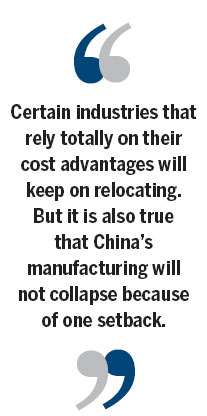What to do as the alarm bell rings
Updated: 2012-08-31 10:42
By Li Meng (China Daily)
|
|||||||||||

As the industrial engine slows, both governments and companies need to act
There are signs that the engine of the world factory, China, is slowing down. Recent data indicate that in the non-financial services sector the number of newly established foreign enterprises and the amount of used foreign investment are falling, painting a picture of foreign investment withdrawing from China.
From January to July 13,677 foreign enterprises entered China, down 12.3 percent year-on-year, and the used foreign investment fell 3.6 percent to $66.67 billion from a year earlier.
In June, used foreign investment was $12 billion, down 6.9 percent year-on-year.
That some foreign investors are pulling out of China is underlined by a series of movements of some foreign sportswear companies.
Adidas AG, the world's No 2 sporting-goods giant, announced that it will close its factory in Suzhou, Jiangsu province, at the end of October.
Other leading brands such as Nike, K-Swiss and Bakers are opening new plants in Vietnam and Indonesia.
But it is not only foreign investors who are moving out. China's domestic companies are also beginning to invest overseas and set up factories there. For example, Lenovo Group, China's largest PC maker, decided in March to transfer some production lines to Japan.
Other technology companies from China such as ZTE Corp, Huawei, Midea and Green are speeding up their expansion into overseas markets.
The outflow of foreign investment and the overseas expansion of Chinese companies have sparked a debate on the deteriorating status of China's manufacturing. What then are the reasons?
First, rising costs have undermined China's status as the world's factory. Its eroding demographic dividends, coupled with the rising price of raw materials, have sharply pushed up operating costs.
"Made in China" no longer means low costs. As a result, more and more companies are getting out.
Second, emerging markets in Southeast Asia have burst onto the global scene, offering an alternative to China.
Southeast Asian nations, because of their cost advantages, hold a growing appeal for foreign investment. Last year foreign capital flowing to those markets amounted to $117 billion, up 26 percent from 2010, and will probably exceed that flowing into China this year.
Third, many Western companies are repatriating, in response to their governments' efforts to reinvigorate domestic manufacturing.
For example, the US multinational automaker Ford Motor Co decided last year to shift 12,000 manufacturing jobs from Mexico and China back to the US.
And Starbucks Corp, another US multinational company, has said it will have its porcelain cups made in the US Midwest.
So will "Made in China" be replaced by "Made in India" or "Made in Vietnam"? Has the time come for China to give away its status of the world factory?
It is clear that in the long term certain industries that rely totally on their cost advantages will keep on relocating. But it is also true that China's manufacturing will not collapse because of one setback.
For several reasons China still holds a fascination for many investors.
First, after 30 years' development, it has built a supply chain that is reliable and sophisticated.
Second, China is huge. Its booming domestic market offers a great opportunity for foreign investors.
Third, China is going all out to crack down on violations of intellectual property rights, and has established efficient mechanisms to protect them.
Still, the decline of manufacturing is an alarm bell for China. Gone is the time when companies could win the market simply by expanding.
For the time being, government should help manufacturing to prevent a violent shudder that shakes industry as a whole. Tax reforms aimed at reducing company costs need to be accelerated. But if China's manufacturing wants to advance, something more fundamental has to be done.
First, companies should spend more on innovation and move up the value chain.
Second, Chinese manufacturers should make full use of foreign direct investment, focusing on improving their managerial know-how. Skilled workers and professional managers have considerably improved the performance of foreign enterprises, and it is these two kinds of human resources that China lacks.
That is why Chinese companies, even with the same technology as their foreign counterparts, are unable to match them on quality.
The author is a researcher at Samsung Economic Research Institute, China. The views do not necessarily reflect those of China Daily.
(China Daily 08/31/2012 page9)
Today's Top News
Rescuers race against time for quake victims
Telecom workers restore links
Coal mine blast kills 18 in Jilin
Intl scholarship puts China on the map
More bird flu patients discharged
Gold loses sheen, but still a safe bet
US 'turns blind eye to human rights'
Telecom workers restore links
Hot Topics
Lunar probe , China growth forecasts, Emission rules get tougher, China seen through 'colored lens', International board,
Editor's Picks

|

|

|

|

|

|





